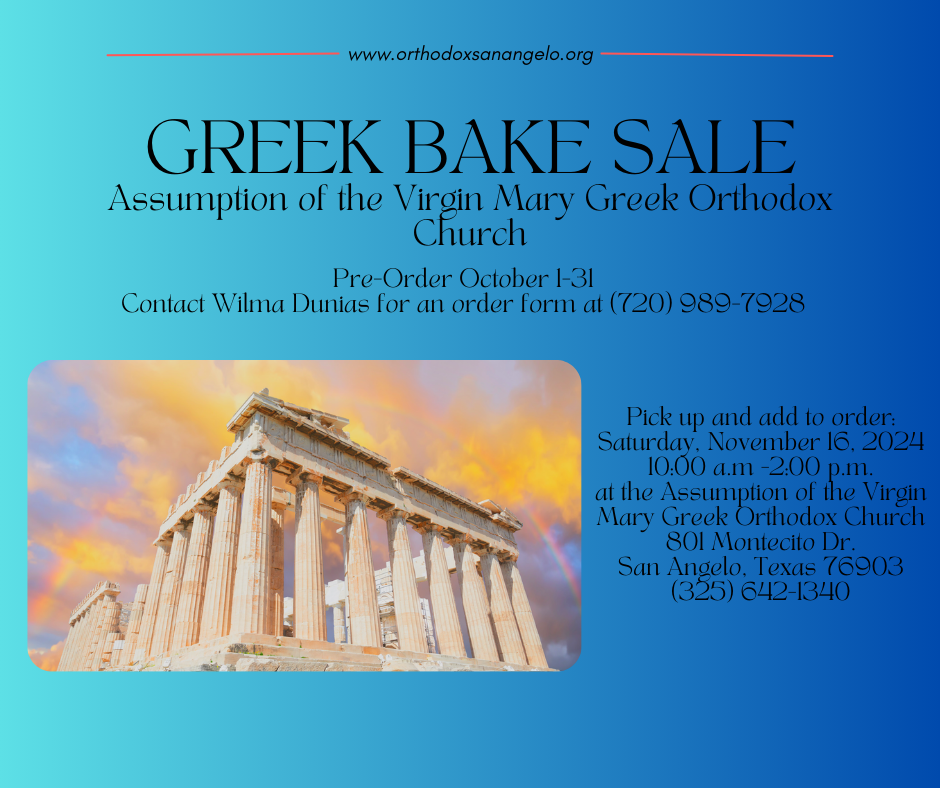"Angelic Forces Are on Our Side," Says Archbishop Elpidophoros at Great Vespers at Archangel Michael Greek Orthodox Church
11/08/2024
On the eve of the Synaxis of the Archangel Michael & the other Bodiless Powers, November 7, 2024, His Eminence Archbishop Elpidophoros of America presided over the Great Vespers at Archangel Michael Greek Orthodox Church in Port Washington, New York.
Archons Create Unique Sunday School Program Focused on Educating Youth About the Ecumenical Patriarchate
11/08/2024
With the blessing of His Eminence Archbishop Elpidophoros of America, Exarch of the Ecumenical Patriarchate, and the venerable Metropolitans of the Eparchial Synod, and in conjunction with National Archon Sunday and the Feast Day of Saint Andrew the First-Called, all Sunday School students now have a unique and unprecedented opportunity to learn about the central importance of the Ecumenical Patriarchate for the Church and the world, and about His All-Holiness Ecumenical Patriarch Bartholomew.
On the Road to Nicaea: Historic Pilgrimage Led by Archbishop Elpidophoros
11/07/2024
The Greek Orthodox Archdiocese of America announces a Historic Pilgrimage led by His Eminence Archbishop Elpidophoros commemorating the 1700th Anniversary of the First Ecumenical Council which convened in Nicaea.
Athletic Club of Ariston Paiana Visits Archdiocese Headquarters
11/07/2024
The fencing Athletic Club of Ariston Paiana visited His Eminence Archbishop Elpidophoros of America at the Archdiocese Headquarters today, November 7, 2024.
Archbishop Elpidophoros Offers Trisagion at Archbishop Michael's Gravesite
11/07/2024
This morning, November 7, 2024, His Eminence Archbishop Elpidophoros of America visited St. Basil Academy in Garrison, New York, where he conducted a Trisagion service alongside clergy, children, and their families at the gravesite of Archbishop Michael of blessed memory.
Protopresbyter of the Ecumenical Throne Thomas Synodinos Visits Archdiocese Headquarters
11/07/2024
On November 4, 2024, His Eminence Archbishop Elpidophoros of America received Rev Protopresbyter of the Ecumenical Throne Thomas Synodinos at the Greek Orthodox Archdiocese of America headquarters.
Department of Religious Education (DRE)’s Sunday Sermon Series: 8th Sunday of Luke, November 10, 2024
11/07/2024
This week, find insights from the Department of Religious Education (DRE) about the upcoming Gospel reading, where we learn about a Samaritan rescuing a helpless man.
Department of Religious Education (DRE)’s Did You Know?: Saint Nektarios
11/07/2024
Did you know that forgiveness works miracles?
Successful Conference Advances Greek Education
11/06/2024
In a vibrant gathering of dedicated educators from the district parishes and day schools, a professional development session took place on November 5, 2024 at the Holy Cross Greek Orthodox Church in Whitestone, NY. The focus of this session was the transformative role of artificial intelligence in education today.
Maliotis Cultural Center to Host “Greek Language, Culture, and Mass Media” International Summer University
11/06/2024
The Maliotis Cultural Center is honored to announce the 11th International Summer University “Greek Language, Culture, and Mass Media,” with the theme “Diaspora mass media: challenges and prospects for the Greek language and culture.”
V. Rev. Archimandrite Meletios Bougas Visits Greek Orthodox Archdiocese of America
11/06/2024
His Eminence Archbishop Elpidophoros of America welcomed V. Rev. Archimandrite Meletios Bougas to the Greek Orthodox Archdiocese of America on Monday, November 4, 2024.
Why Should You Serve on the Parish Council?
11/05/2024
What will you say when someone offers to nominate you to serve on the parish council? Why would anyone take time to sit through monthly meetings, in addition to the likely committee work that it would entail?
Protopresbyter Fr. Paul Palesty of St. Nicholas Greek Orthodox Church in Flushing, NY Announces Retirement
11/05/2024
On October 29, 2024, Protopresbyter Fr. Paul C. Palesty met with His Eminence Archbishop Elpidophoros of America at the Archdiocese Headquarters to request his blessing to retire. Fr. Paul's retirement from St. Nicholas Greek Orthodox Church in Flushing, NY, where he served for twenty-seven years, is set to begin on January 1, 2025.
Department of Inter-Orthodox, Ecumenical, and Interfaith Relations Co-Hosts Panel Discussion on Wildfire Prevention at the United Nations
11/05/2024
On World Ecology Day, November 1, 2024, the Greek Orthodox Archdiocese of America, through the Ecumenical Department, in collaboration with the Permanent Mission of Greece to the UN, the Permanent Mission of Australia to the UN, the Sovereign Order of Malta Permanent Mission to the UN, the World Council of Churches, and Foley Hoag LLP, hosted a side event titled “Forging Paths to Sustainable Wildfire Prevention through Collaborative Governance” at the United Nations Headquarters.
Greek Youth Symphony Orchestra's American Debut Met with Standing Ovation at Carnegie Hall
11/04/2024
The Greek Youth Symphony Orchestra (GYSO) made its much-anticipated American debut to a full audience at Carnegie Hall on Sunday, November 3, 2024. From the first note to the final encore, the musicians captivated hearts with their passion, talent, and unwavering enthusiasm.
Remarks of Bishop Nektarios of Diokeia to Archbishop Elpidophoros on the Occasion of His Patronal Feastday, November 2, 2024
11/04/2024
Today, we gathered in your Cathedral, and on behalf of all the Clergy and Laity of the Sacred Archdiocese of America, I extend to Your Eminence our heartfelt best wishes and fervent prayers on the occasion of your Patronal Feast Day, the feast of the Holy Martyrs.
Three New Episodes from "Vengan a Recibir la Luz"
11/04/2024
"Vengan a Recibir la Luz," the Spanish-speaking ministry of Orthodox Christian Network, has released three new episodes.
Rev. Fr. Nicholas Pilavas Elevated to Protopresbyter of the Ecumenical Throne
11/04/2024
On Sunday, Nov. 3, 2024, after celebrating Orthros and Divine Liturgy, His Eminence Archbishop Elpidophoros of America elevated the Rev. Fr. Nicholas Pilavas to the rank of Protopresbyter of the Ecumenical Throne, thanking him for his 45 years of service to Prophet Elias Greek Orthodox Church in Yonkers, NY.
Archbishop Elpidophoros Celebrates Name Day, Ordains Gregory Gounardes to the Diaconate
11/03/2024
On the occasion of His Eminence Archbishop Elpidophoros of America’s name-day, November 2, 2024, hierarchs and clergy, Archdiocese staff, parish faithful, and Holy Cross seminarians gathered to celebrate the Divine Liturgy at the Archdiocesan Cathedral of the Holy Trinity in New York City.






